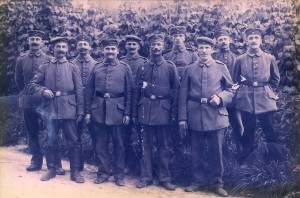Richard Holbrooke’s German War Photo–And Mine
I’ve been quietly reading as much as I can find about Richard Holbrooke since the diplomat’s unexpected death earlier this month. And I’ve noticed that in several articles, including this reprinted excerpt from Abigail Pogrebin’s Stars of David: Prominent Jews Talk About Being Jewish, mention has been made of a certain photograph close to Holbrooke’s heart:
A New York Times profile of Holbrooke during his tenure in Germany described how he displayed, in his elegant ambassador’s residence, a photograph of his grandfather in a World War I uniform: “I show it to German visitors as a symbol of what they lost,” Holbrooke told the Times. When I ask him about it now, he shows me the very picture. “Every German family has a photograph like that. And so I just kept it in the living room. Some people would ignore it; others would stop and stare at it. Some would demand to know why it was there—what was the message I was sending? I said, ‘This is an existential fact; this is my grandfather. You may read anything you wish into this photograph.’ And I also said, ‘If history had turned out differently, maybe I’d be Germany’s ambassador to the United States instead of America’s ambassador to Germany.’ My mother didn’t like it at all. She said it was a militaristic picture and there are a lot of nicer pictures; she’s not into symbolism at all. And it’s true; I could have had an ordinary picture of my grandfather. But don’t you find that picture—the original, with his handwriting—extraordinary?”
I don’t know about every German family, but my German-Jewish (now American) family has a photo like this, too. And I have a copy in my home, clustered within a group of other family photographs. It depicts my great-grandfather, Kaufmann Dreifus, with his German soldier fellows.

We’re not sure of the date, but we know that Kaufmann (like the character modeled after him in “Matrilineal Descent,” the second story in my forthcoming short-fiction collection, Quiet Americans) served his native Germany in World War I. (He died a few years later, a diabetic before insulin became widely available.)
It’s true. I, too, could display an ordinary picture of my great-grandfather.
But don’t you find this picture—not to mention the fact that a copy remains for me to scan into a computer from my home in New York City—extraordinary?
A side note: I reviewed Stars of David when it was published five years ago. To read the review, please click here.
Erika, I found this very interesting. Perhaps even American Jews whose ancestors are a little more far flung have stories like this. For instance, my maternal great-grandparents were born in present-day Poland near the border of the Czech Republic, which at that time was the Austro-Hungarian Empire. I recall my grandmother (born in Louisville, KY) telling me that during World War I, her mother had terrible fears that her brother (fighting for the Empire) would face her son (fighting for the US). Fortunately, this never happened, as my great-uncle was in the Navy, and the war ended before he was shipped overseas. The European side of my family was murdered during the Holocaust, and I never did find out more about them.
Erika,
Fighting for germany in WW 1 is what saved many Jewish people during the Holocaust.
One day Hitler decided, for no apparent reason, that every one who had received the Iron Cross for serving the Fatherland in the previous war, should be immediately released from concentration camp or prison. Fortunately almost all the soldiers in that war received the Iron Cross.
I personally know two people, one of whom was my Grandfather, whose life was saved by this decree and as soon as they were released from Sachsenhausen concentration camp they fled the country before Hitler could change his mind.
Thank you for the comments. Yes, Ann, I’m aware of the privileges, for lack of a better phrase, accorded to German WWI veterans later on. In fact, that’s something I’ve integrated into “For Services Rendered,” the story that opens my collection.
But these comments, I think, highlight a larger point: Holbrooke’s.